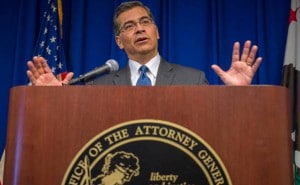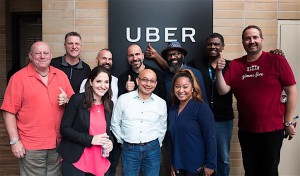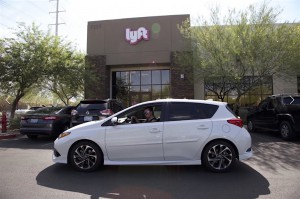
California Attorney General Xavier Becerra filed suit against Uber and Lyft, saying they are ignoring state law classifying drivers as employees.
In a fight critical to their future business model, Uber and Lyft have lost a battle in their legal fight about whether their drivers are company employees or independent contractors.
A state judge in California ruled in favor of a new state law, Assembly Bill 5, which basically prohibits the two ride-sharing companies from classifying drivers as independent contractors, who are not entitled to benefits, and identifies them as employees entitled to various state and federally mandated benefits.
The ruling was on step in what has now become a long running effort by California’s liberal state legislature to rein in the so-called “gig” economy and force companies of all sorts to compensate the workers employed by companies such as Uber and Lyft.
(Uber, Lyft hit by decision declaring drivers are employees.)
The business model for both companies, which depends on a critical phone app to arrange rides for customers and payment for the service, has utilized part-time drivers and their vehicles from day one. Many of the drivers are full-timers and both companies have developed standards for the vehicles the employees are required to use.
Uber and Lyft have battled against the California law and are certain to appeal the court decision that goes against them.
“Drivers do not want to be employees,” Lyft said in a statement. “Ultimately, we believe this issue will be decided by California voters and that they will side with drivers,” it added.
But many drivers have agitated for employee status, which offers a bit more security than their precarious status as gig workers and they have found plenty of allies in California’s political establishment, who are concerned that the gig economy is feeding economic inequality.
(Uber, Lyft post Q1 losses; find bright spots in business.)
The lawsuit against the two ride-sharing companies was filed by California Attorney General Xavier Becerra and supported by the cities of Los Angeles, San Diego and San Francisco.

Uber and Lyft are supporting a measure on the November ballot in California classifying drivers as independent contractors.
In the opinion granting California’s request for a preliminary injection cited a “prolonged and brazen refusal” to comply with state law, while lawyers for the state had ample evidence to support the request for an injunction.
“This is a resounding victory for thousands of Uber and Lyft drivers who are working hard – and, in this pandemic, incurring risk every day – to provide for their families,” Los Angeles City Attorney Mike Feuer said in a statement.
According to various new accounts, Schulman delayed enforcing his order by 10 days to allow appeals, which Lyft said it will pursue.
(Uber, Lyft drives have poor recall repair record.)
Meanwhile, Uber and Lyft are promoting a November ballot initiative, Proposition 22, to classify app-based drivers as contractors. The state is Uber’s and Lyft’s largest U.S. market. Like other ballot initiatives in California, Prop 22 is likely to wind up in court if the big spending campaign by the two ride-sharing companies succeeds.

